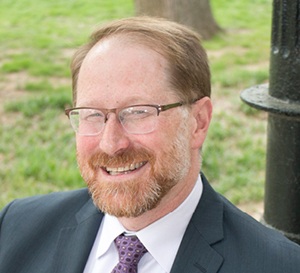New Leadership: Meet Vanderbilt Kennedy Center (TN UCEDD, LEND, IDDRC) Director Jeffrey Neul
October 5, 2017

|
On August 1, the Vanderbilt Kennedy Center (TN UCEDD, LEND, IDDRC) welcomed a new director to lead the Center in addressing its mission of facilitating discoveries and best practices that make positive differences in the lives of persons with developmental disabilities and their families.
Jeffrey Neul, M.D., Ph.D., comes from the University of California San Diego where he was the division head of Child Neurology and vice chair for Developmental Neurosciences.
Neul is an internationally known expert in genetic neurodevelopmental disorders, specifically Rett syndrome. This neurodevelopmental disorder primarily affects girls and is characterized by loss of hand skills, loss of spoken language, and development of repetitive hand movements. He conducts clinical research and clinical trials on Rett syndrome, genetic research to identify other genetic causes of neurodevelopmental disorders, and translational research using disorder models to identify and to test novel treatments for these disorders.
A native of Chicago, Neul earned his undergraduate degree at the University of Illinois at Urbana-Champaign, his medical and doctorate degrees from the University of Chicago, and completed his residency and fellowship in child neurology at Baylor College of Medicine and Texas Children's Hospital.
"As a graduate student, I did research with fruit flies in very basic science and embryogenesis," said Neul. "I chose to do that work because I was interested in the science, but also around that same time I developed an affinity for working with children. I was always intrigued by the brain and in understanding how it works and how it might be impaired, so I began trying to use that knowledge to do clinical work and help individuals who have intellectual and developmental disabilities. The prospect of being able to identify genetic causes, test novel treatments, and do direct care excites me and fuels my work."
In 2016, Vanderbilt's Rett Syndrome Clinic was named a Rett Syndrome Clinical Research Center of Excellence by Rettsyndrome.org. Led by Sarika Peters, Ph.D., and Cary Fu, M.D., Vanderbilt's clinic is one of only 14 sites nationwide to receive this designation.
"The Rett Syndrome designation is fantastic and recognizes the ongoing, good work that has been done by Sar Peters and Cary Fu," said Neul. "In terms of clinical care and clinical research on Rett syndrome, I am very excited to focus on broadening and enhancing the profile of these efforts at Vanderbilt and to collaborate with the people here doing translational research."
Since arriving, Dr. Neul has been busy setting up his lab, hiring new research staff, and meeting with VKC faculty and staff to learn more about current programs and projects. He says he was attracted to the VKC because of its long history of leading efforts in understanding developmental disabilities.
"There are major strengths coming out of the work of VKC members and investigators," said Neul. "Major advances in behavioral and educational therapies and in biological sciences have been made here. It is exciting to think about how we bridge all these aspects and even integrate them into a comprehensive approach to develop precision care for people with intellectual and developmental disabilities.
"Of course comprehensive care can mean many things. Using Rett syndrome as an example, there is a lot of interest in gene therapies or small molecule therapies that might reactivate the broken gene or provide a new copy of the broken gene. However, I think we all recognize that just providing that is not going to do enough. We also will need to reeducate and retrain people who have lost the ability to do things like speak or walk.
"Gene therapy may give the potential or may allow opportunities for the brain to be rewired, but we also need to be able to intervene and essentially reteach individuals how to do things they had lost the ability to do. The commitments and work of the VKC throughout its history have looked at people with a broad lens and have translated knowledge and practice in ways that benefit the entire person."
Neul says much of his time will focus on identifying where new opportunities may lie for the VKC. In a time of financial and political uncertainty, he emphasizes the importance of making the case to legislators and policymakers that disability issues affect large numbers of people, including their constituents.
"Developmental disabilities range from not particularly rare to very rare, but as a collective they are not at all rare," said Neul. "It's widespread. Disability touches a lot of people's lives. It's important to relay to our elected officials that we are at a time when we have made a lot of advances, but we also have huge potential to make even more advances that will make a big impact on the quality of life of affected people. So, as a Center and as a larger network, a focus on educating policymakers about the importance of scientific advances is something we need to promote. Educational advocacy and policy are and should be a part of everything we do."
Neul is joined in Nashville by his wife Shari, who is a child psychologist, and their daughter Colette and son Konrad.







